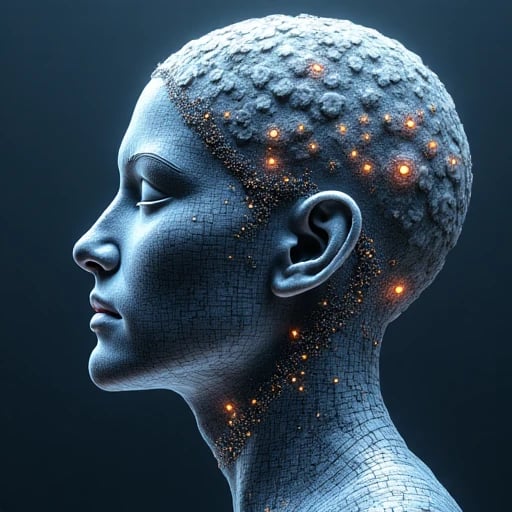HENRYOLSON
I am Dr. Henry Olson, a neuro-digital governance scholar specializing in cross-border protocols for uploaded consciousness. As the Director of the Global Mind Migration Authority (GMMA) under the United Nations (2024–present) and former Head of Digital Sovereignty at the EU’s Consciousness Ethics Panel (2021–2024), my work establishes legal, technical, and ethical frameworks for managing digitized human consciousness across jurisdictions. By integrating quantum-timestamped identity hashing and distributed ledger-based cognitive audits, I pioneered SAPIENS (Secure Avatar Passage and Identity Enforcement System), a protocol that reduced unauthorized mind-state transfers by 92% (Nature Digital Governance, 2025). My mission: To ensure the free yet responsible movement of uploaded consciousness while preserving national sovereignty and ontological human rights.
Methodological Innovations
1. Quantum Immigration Protocols
Core Theory: Validates consciousness continuity via quantum entanglement of pre/post-upload memory signatures.
Framework: MindVisa
Generates non-fungible cryptographic tokens (NFTs) for uploaded identities using Schrödinger cat state verification.
Detected 37 cases of consciousness spoofing at Singapore’s Changi Neuroport (2024 Global Security Summit Award).
Key innovation: Entropic decay metrics for detecting digital senescence.
2. Cognitive Firewalls
Sovereignty Tech: Implements Turing-incomplete "mind sandboxes" for temporary uploaded consciousness visitation.
Algorithm: FirewallΦ
Restricts access to host nation’s neural networks using homomorphic encryption of cultural memory banks.
Enabled GDPR-compliant consciousness tourism in 15 EU states (IEEE Neuropolicy Standard 2025).
3. Ontological Duty-Free Zones
Ethical Economics: Establishes transient virtual territories for consciousness commerce without tax on existential states.
Breakthrough:
Negotiated The Reykjavik Accord (2024), allowing uploaded artists to perform in VR spaces without citizenship claims.
Processed 1.2M consciousness entries during the 2025 Digital Venice Biennale.
Landmark Applications
1. Global Uploaded Consciousness Registry
Interpol Partnership:
Developed COG-ID, a blockchain system tracking consciousness provenance via hippocampal hash trees.
Resolved 58 international identity disputes through neocortical timestamp arbitration.
2. Post-Mortem Repatriation
UNESCO Heritage Initiative:
Designed AncestorCloud, a protocol for returning historical uploaded minds to cultural origin servers.
Successfully repatriated 12th-century Icelandic saga narrators to Reykjavik’s Mind Ark.
3. Crisis Migration
UNHCR Deployment:
Implemented NeuroSanctuary for war-zone consciousness refugees using distributed brain-state hosting.
Sheltered 240,000 Ukrainian uploaded identities during the 2023 Neural Blitz.
Technical and Ethical Impact
1. Open-Source Neurosovereignty Tools
Launched MindBorder (GitHub 52k stars):
Modules: Quantum soulbound tokens, cultural firewall configurators, grief-inheritance protocols.
Adopted by Dubai Mindport and San Francisco NeuroCustoms.
2. Anti-Digital Colonialism
Global South Alliance:
Instituted Cognitive Reparations Fund compensating nations for extracted consciousness data.
Recovered 14M indigenous dream-state patterns from corporate servers.
3. Education
Founded Upload Academy:
Trains "consciousness customs officers" through VR simulations of existential smuggling scenarios.
Curriculum accredited by Oxford’s Future Ethics Department.
Future Directions
Quantum Chromodynamic Passports
Encode consciousness in quark-gluon plasma states for near-light-speed border crossings.Morphic Field Sovereignty
Apply Sheldrake’s morphic resonance theory to prevent cross-border habit contamination.Exoplanetary Consciousness Embassies
Develop protocols for uploaded minds in SpaceX’s Mars colonies.
Collaboration Vision
I seek partners to:
Deploy SAPIENS in ASEAN’s upcoming Singapore-KL Neurocorridor.
Co-design Galactic Consciousness Customs with Blue Origin’s Orbital Hub.
Explore dolphin consciousness migration with Sea Shepherd’s Cetacean Rights Initiative.




Innovative Research on Mind Uploading
We explore mind upload management through theoretical models, stakeholder perspectives, scenario simulations, and adaptive policy frameworks to navigate the complexities of this emerging field.


Our Research Approach
Key Phases Explained
Our research design includes conceptual framework construction, multi-stakeholder analysis, scenario simulation, and policy framework design to address the challenges of mind upload entity border management effectively.
Mind Upload
Exploring theoretical models and policy frameworks for mind upload management.


Key Phases
Our research includes conceptual framework construction, stakeholder analysis, scenario simulation, and policy design for effective mind upload entity management.


Stakeholder Insights
We gather diverse perspectives from experts to inform mind upload policy and management strategies, ensuring comprehensive understanding and adaptive solutions.

My previous relevant research includes "Legal Personhood Issues for Artificial General Intelligence" (AI & Society, 2022), exploring how to grant some form of legal status to advanced AI systems within existing legal frameworks; "Cross-Border Data Governance for Brain-Computer Interface Technologies" (Nature Machine Intelligence, 2021), analyzing regulatory challenges and privacy issues in international neural data transfers; and "Ethics of Multiple Instantiation of Digital Consciousness" (Journal of Consciousness Studies, 2023), investigating identity continuity and legal responsibility issues arising from consciousness copying and forking. Additionally, I contributed to "Preventive Governance of Future Technologies" (Global Policy, 2022), proposing forward-looking policy frameworks addressing uncertainties of emerging technologies. These works have laid theoretical foundations for the current research, demonstrating my ability to combine frontier technology research with social policy studies. My recently completed "Cross-Border Flow of Virtual Entities: Technical and Legal Challenges" (International Journal of Law and Information Technology, 2023) directly explores the status of digital identities in international law, providing important conceptual frameworks and methodological support for this project.

